W.H.F. Barnes (1909–90), born in Ashton, Greater Manchester and educated at Manchester Grammar School and Corpus Christi, Oxford, was a philosopher best known for his criticisms of logical positivism. He graduated BA in 1936 with the John Locke scholarship. He served as lecturer at Liverpool before the Second World War and was appointed Professor of Philosophy at the University of Durham 1945-59. From 1959–63 he was Professor of Moral Philosophy at the University of Edinburgh, and his final appointment was as the Sir Samuel Hall Professor of Philosophy at the University of Manchester (1970–73). Barnes was asked to deliver the Gifford Lectures at the University of Edinburgh 1968–70 on the topic of “Knowledge and Faith” but contrary to the longstanding tradition, these lectures are unpublished.
Barnes was most well-known for his defence of what he termed “speculative philosophy” and his criticism of the analytic philosophers of his own day—these would include Wittgenstein, the Vienna Circle, the logical positivists and fellow Gifford lecturer, A.J. Ayer. His inaugural lecture at Durham, entitled “Is Philosophy Possible?” was later expanded into The Philosophical Predicament (1950.) Barnes writes against those who argued that the traditional speculative and metaphysical branches of philosophy must be abandoned because of the findings of “analysis” (analytic, logical or linguistic) This, Barnes argued, landed the analyst in the predicament they sought to escape. The philosophical analysis conducted by figures such as Ayer and G.E. Moore fundamentally alters the object of analysis—what Barnes terms “interpretation.”
Much of Barnes work is little known in the present, as few contemporary philosophers would seek to defend the narrow vision of philosophy that he wrote so compellingly against. However, as a record of a particular moment in philosophical history and for his lucid and urbane style of writing, his work should find a wider audience.



